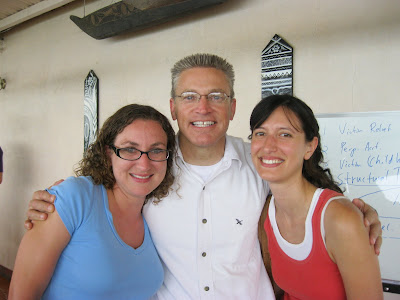

At the IJM Cebu Field Office, we are working with local Churches to build relationships with victims of trafficking. While these girls receive psychological counseling and guidance in Rehabilitation centers, upon re-entering their community, continued support is sadly lacking. As we have found in our research, girls are put back into the risky conditions of broken families and poverty that lead them to being trafficked in the first place.
Anita* was one such case that could have ended bitterly. She was rescued from a raid in 2007, receiving care at a government shelter in Cebu City. While at the center, an eye disease was discovered, caused by years of malnutrition. When she turned eighteen, she was returned to her mother’s place in a squatter’s settlement (The house was no bigger than the size of two bathrooms, housing nine people). Several months later ,when IJM was able to get in contact with her again, not only was she not attending school as she had planned, but her eye-sight had severely deteriorated. IJM was able to intervene and get her the urgent medical care that she needed, but not before permanent damage was done. Fortunately, Anita is now going back to school in Manila and is scheduled for an eye operation in the U.S. But we think that there are a number of things that we can change about victim aftercare to make effective and lasting improvement in these girls’ lives.
One large component is healthy and caring relationships in the community. Church organizations are in the best position to monitor and guide these vulnerable girls. For example, if a concerned member of the church had been in regular contact with Anita, the help she needed would have come a lot sooner. In the future, we’d even hope for church outreach to help families work on becoming a safe household by the time their daughter is scheduled to return. More so, making healthy decisions for oneself requires faith in God, and Churches know a lot about that. They can also provide the kind of role models that these girls need to begin to imagine a life without exploitation.
In December, we had our first Support Group formation, which aims to build individualized projects with Churches in target communities. Please pray that the seed that we’ve planted will grow into fruitful and invaluable relationships for our clients in 2011.
Best Wishes,
Ali
Anita* was one such case that could have ended bitterly. She was rescued from a raid in 2007, receiving care at a government shelter in Cebu City. While at the center, an eye disease was discovered, caused by years of malnutrition. When she turned eighteen, she was returned to her mother’s place in a squatter’s settlement (The house was no bigger than the size of two bathrooms, housing nine people). Several months later ,when IJM was able to get in contact with her again, not only was she not attending school as she had planned, but her eye-sight had severely deteriorated. IJM was able to intervene and get her the urgent medical care that she needed, but not before permanent damage was done. Fortunately, Anita is now going back to school in Manila and is scheduled for an eye operation in the U.S. But we think that there are a number of things that we can change about victim aftercare to make effective and lasting improvement in these girls’ lives.
One large component is healthy and caring relationships in the community. Church organizations are in the best position to monitor and guide these vulnerable girls. For example, if a concerned member of the church had been in regular contact with Anita, the help she needed would have come a lot sooner. In the future, we’d even hope for church outreach to help families work on becoming a safe household by the time their daughter is scheduled to return. More so, making healthy decisions for oneself requires faith in God, and Churches know a lot about that. They can also provide the kind of role models that these girls need to begin to imagine a life without exploitation.
In December, we had our first Support Group formation, which aims to build individualized projects with Churches in target communities. Please pray that the seed that we’ve planted will grow into fruitful and invaluable relationships for our clients in 2011.
Best Wishes,
Ali



.JPG)